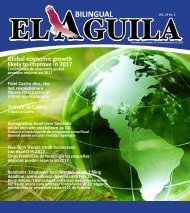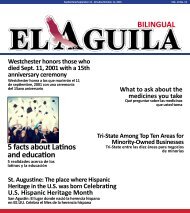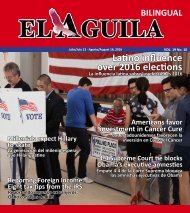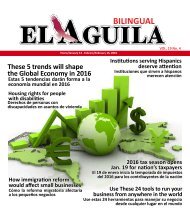El Aguila Magazine – December 16, 2015
Create successful ePaper yourself
Turn your PDF publications into a flip-book with our unique Google optimized e-Paper software.
<strong>El</strong> <strong>Aguila</strong> Diciembre/<strong>December</strong> <strong>16</strong> - Enero/January 12, 20<strong>16</strong><br />
Estudio encuentra problemas en la detección de fraude entre los solicitantes de asilo<br />
WASHINGTON<br />
- <strong>El</strong> gobierno de<br />
Obama está teniendo<br />
problemas para<br />
detectar el fraude en las<br />
solicitudes de asilo de inmigrantes<br />
que tratan de<br />
permanecer en los Estados<br />
Unidos para su protección,<br />
de acuerdo con un estudio<br />
del gobierno.<br />
La Oficina de Responsabilidad<br />
Gubernamental<br />
(GAO por sus siglas en inglés)<br />
vio las solicitudes de<br />
asilo de inmigrantes que ya<br />
han llegado a los Estados<br />
Unidos y que están pidiendo<br />
quedarse para escapar de<br />
la persecución. <strong>El</strong> informe,<br />
publicado recientemente,<br />
no se ocupa del proceso de<br />
solicitud de refugiado, que<br />
también es supervisado por<br />
el Departamento de Seguridad<br />
Nacional, sino que<br />
implica la gente que no está<br />
actualmente en los Estados<br />
Unidos. <strong>El</strong> proceso de los<br />
refugiados se ha convertido<br />
en un problema en el<br />
debate sobre los refugiados<br />
sirios.<br />
<strong>El</strong> informe de 96 páginas<br />
concluyó que ni la Agencia<br />
de Inmigración y servicios<br />
de Ciudadanía ni la Oficina<br />
Ejecutiva para Revisión de<br />
Inmigración, la agencia del<br />
Departamento de Justicia<br />
que supervisa los tribunales<br />
de inmigración, llevan<br />
a cabo evaluaciones de<br />
riesgo de fraude regulares.<br />
La GAO recomienda que<br />
ambas lo hagan.<br />
En USCIS, un sistema de<br />
presentación en papel que<br />
no capta la información<br />
clave de detección de fraude<br />
electrónico también es<br />
un problema, dice el estudio.<br />
La revisión de la GAO encontró<br />
que a más de 4.500<br />
personas le fueron otorgado<br />
asilo en 2014 a pesar<br />
de estar asociados con los<br />
abogados o los preparadores<br />
de documentos detenidos<br />
ese mismo año en una<br />
investigación de fraude<br />
de inmigración en Nueva<br />
York.<br />
USCIS revisa los casos<br />
cuando hay una conexión<br />
con alguien implicado en<br />
un caso de fraude de inmigración.<br />
No está claro si<br />
alguno de los casos aprobados<br />
están implicados en<br />
fraude.<br />
USCIS tiene la autoridad<br />
de revocar el asilo y lo hizo<br />
en los casos de 374 personas<br />
de 2010 a 2014, dijo la<br />
GAO.<br />
<strong>El</strong> portavoz de USCIS Joseph<br />
Holstead dijo que la<br />
agencia está de acuerdo<br />
con las recomendaciones y<br />
ya ha completado dos. Pero<br />
dijo que el informe no tiene<br />
en cuenta las recientes<br />
mejoras en los esfuerzos<br />
de detección de fraude de<br />
la agencia, incluyendo la<br />
creación de una rama dedicada<br />
a la Detección de<br />
Fraude y Seguridad Nacional<br />
dentro de la división de<br />
asilo de la agencia.<br />
<strong>El</strong> número de solicitudes<br />
de asilo se ha más que<br />
duplicado en los últimos<br />
años. Durante el ejercicio<br />
presupuestario de 2010, se<br />
realizaron 47,118 solicitudes<br />
de asilo. Ese número se<br />
elevó a 108.152 en 2014.<br />
En <strong>2015</strong>, según el estudio,<br />
hubo un atraso de 106,121<br />
casos pendientes.<br />
Esa cartera incluye miles<br />
de solicitudes de asilo<br />
presentadas por niños centroamericanos<br />
que viajan<br />
solos y familias atrapadas<br />
en la frontera en los últimos<br />
años.<br />
La GAO hizo 10 recomendaciones<br />
para mejorar la<br />
detección del fraude en el<br />
USCIS, incluyendo la contratación<br />
y capacitación de<br />
más oficiales de asilo.<br />
Tanto Seguridad Nacional<br />
y la agencia de la corte de<br />
inmigración están de acuerdo<br />
con las recomendaciones.<br />
Se espera que Juan Osuna,<br />
que supervisa el sistema de<br />
corte de inmigración, sea<br />
presionado sobre el fraude<br />
durante una audiencia de la<br />
Cámara.<br />
“Este nuevo informe de la<br />
GAO se suma a la evidencia<br />
de que el gobierno de<br />
Obama se niega a tomar<br />
las medidas necesarias para<br />
acabar con el fraude de asilo<br />
y proteger la integridad<br />
de nuestro sistema de inmigración<br />
“, dijo el representante.<br />
Bob Goodlatte, el republicano<br />
de Virginia, que<br />
es presidente del Comité<br />
Judicial de la Cámara.<br />
Fuente: AJC.com<br />
Study finds problems in detecting fraud among<br />
asylum seekers<br />
WASHINGTON<br />
— The Obama<br />
administration is<br />
having trouble detecting<br />
fraud in asylum requests<br />
from immigrants seeking<br />
to stay in the United States<br />
for their protection, according<br />
to a government<br />
study.<br />
The Government Accountability<br />
Office looked at<br />
asylum requests from<br />
immigrants who have already<br />
made it to the United<br />
States and are asking<br />
to stay to escape persecution.<br />
The report, released<br />
doesn’t address the refugee<br />
application process,<br />
which also is overseen by<br />
the Homeland Security<br />
Department but involves<br />
people not currently in the<br />
United States. The refugee<br />
process has become an issue<br />
in debate over Syrian<br />
refugees.<br />
The 96-page report concluded<br />
that neither U.S.<br />
Immigration and Citizenship<br />
Services nor the Executive<br />
Office for Immigration<br />
Review, the Justice<br />
Department agency that<br />
oversees immigration<br />
courts, conducts regular<br />
fraud risk assessments.<br />
The GAO recommended<br />
that both do so.<br />
At USCIS, a paper filing<br />
system that doesn’t capture<br />
key fraud-detection<br />
information electronically<br />
also is a problem, the study<br />
says.<br />
The GAO review found<br />
that more than 4,500 people<br />
were awarded asylum<br />
in 2014 despite being associated<br />
with lawyers or<br />
document preparers arrested<br />
that same year in an<br />
immigration fraud investigation<br />
in New York.<br />
USCIS reviews cases<br />
when there is a connection<br />
to someone implicated<br />
in an immigration fraud<br />
case. It is unclear if any of<br />
the approved cases involved<br />
fraud.<br />
USCIS does have the authority<br />
to revoke asylum and did<br />
so in the cases of 374 people<br />
from 2010 to 2014, the GAO<br />
said.<br />
USCIS spokesman Joseph<br />
Holstead said the agency<br />
agrees with the recommendations<br />
and has already completed<br />
two. But he said the<br />
report doesn’t take into account<br />
recent improvements<br />
in the agency’s fraud detection<br />
efforts, including the<br />
creation of a dedicated Fraud<br />
Detection and National Security<br />
branch within the<br />
agency’s asylum division.<br />
The number of asylum requests<br />
has more than doubled<br />
in the last several years.<br />
During the 2010 budget year,<br />
47,118 asylum requests were<br />
made. That number rose to<br />
108,152 in 2014. By <strong>2015</strong>, the<br />
study found, there was a backlog<br />
of 106,121 pending cases.<br />
That backlog includes thousands<br />
of asylum requests made<br />
by Central American children<br />
traveling alone and families<br />
caught at the border in the last<br />
few years.<br />
The GAO made 10 recommendations<br />
for improving fraud<br />
detection at the USCIS, including<br />
hiring and training more<br />
asylum officers.<br />
NOTICIAS DE INMIGRACIÓN/<br />
IMMIGRATION NEWS<br />
T:4.917”<br />
Both Homeland Security and the<br />
immigration court agency agreed<br />
with the recommendations.<br />
LAS PERSONAS MAYORES Y LOS CLIENTES CON<br />
NECESIDADES ESPECIALES NO SIEMPRE SABEN A<br />
DÓNDE ACUDIR. AQUÍ LES TENDEMOS UNA MANO.<br />
7<br />
Juan Osuna, who oversees the<br />
immigration court system, is expected<br />
to be pressed about fraud<br />
during a House oversight hearing.<br />
“This new GAO report adds to<br />
mounting evidence that the Obama<br />
administration refuses to<br />
take the steps necessary to crack<br />
down on asylum fraud and protect<br />
the integrity of our immigration<br />
system,” said Rep. Bob<br />
Goodlatte, the Virginia Republican<br />
who is chairman of the House<br />
Judiciary Committee.<br />
Source: AJC.com<br />
Si usted tiene 62 años<br />
de edad o más, o tiene<br />
problemas de visión,<br />
audición o habla u otra<br />
discapacidad, podría<br />
calificar para una<br />
protección especial en<br />
materia de servicios<br />
públicos según la ley<br />
del estado de Nueva<br />
York. Si tiene problemas<br />
de audición, obtenga<br />
acceso gratuito a un<br />
servicio de retransmisión<br />
de telecomunicaciones<br />
(Telecommunications<br />
Relay Service,<br />
TRS) llamando al 711.<br />
A quienes tienen<br />
problemas de visión,<br />
O&R puede<br />
proporcionarles facturas<br />
en letra grande o en<br />
braille. Para obtener más<br />
información, llame sin<br />
cargo al 1-877-434-4100<br />
o visítenos en oru.com.
















